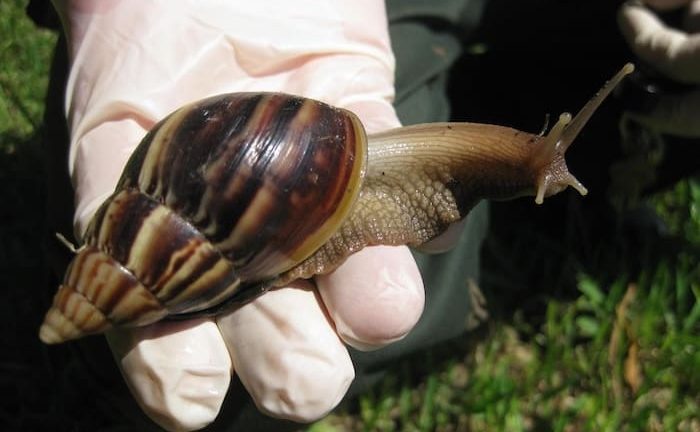
Giant African Snail. Source: NSW DPI
THE DEPARTMENT of Agriculture, Fisheries and Forestry (DAFF) has confirmed the detection of a high-risk invasive pest, the Giant African Snail (GAS), on the deck of a container vessel at Port Botany on Monday.
The incursion was reported via the DAFF’s online system.
A DAFF spokesperson said 150 containers were offloaded from the vessel and “will require inspection for the presence of snails”.
“No snails have been found on any containers inspected at this time,” the spokesperson said.
Currently not found in Australia, GAS are among the world’s most destructive pests, with DAFF estimating that an incursion would cost the economy about $1.9 billion over 20 years.
The pest is known to feed on more than 500 species of plants including pulse and legume crops, cotton, vegetables, ornamental plants, and the bark of large trees.
Due to its large size, GAS have a ferocious appetite capable of destroying or causing severe damage to entire crops.
Australia’s Freight & Trade Alliance became aware of the detection on Wednesday and shortly after informed its members of the incident.
FTA general manager – trade policy and operations Sal Milici said this incident demonstrated that the system was working as intended. as an outbreak of GAS “would have been devastating” for some agricultural sectors and the environment.
“The Giant African Snail is one of the most damaging pests around,” Mr Milici said.
“It’s a good sign that the biosecurity net works, that they have been identified, and they are being chased down.”
Communication gaps
Mr Milici said the incident revealed weaknesses in the system for communicating pest incursions across the supply chain.
He said currently after a pest is located, the impacted containers are put on hold and DAFF contacts the principal shipping agent to facilitate the cleaning process.
“DAFF don’t directly communicate with the other parties in the supply chain that are involved, even though they theoretically could.”
Mr Milici said it is the shipping agent’s responsibility to contact the freight forwarders and customs brokers to tell them the containers were not cleared to be removed.
He said that in this instance, members of the FTA reported cases where they had scheduled trucks to collect shipping containers, only to be informed later that the containers were being held, forcing the trucks to turn back.
He said this caused delays and additional costs for those involved.
“It would have been ideal if communication would have been better.
“I’m calling for an exploring of better systems or processes.
“I dare say this is going to happen again…andd when there is another one of these incidents, we should work out who should be informing who and how.”
GAS background
GAS is one of the largest land snails in the world, with a shell ranging from 50-200mm in length.
It is native to coastal eastern Africa but is also found across Asia, the Pacific, the Americas and Europe.
A DAFF spokesperson said the pest was last detected on the structure of a vessel in February 2024.
“Sea containers arriving from countries with high levels of historical detections of Giant African Snails are subject to heightened biosecurity measures on arrival, including mandatory inspection.
“We are also working to strengthen our biosecurity system to protect Australia from the increasing risk of hitchhiker pests arriving on sea containers.”
There have been only a few reported incursions on Australian soil in recent years.
These include the detection of a single snail at a property in the Currumbin Valley, Queensland in 2004 and another lone GAS found in a Brisbane container yard in 2013.
The last outbreak of the pest occurred in Gordonvale near Cairns in 1977, with the snails found at the base of banana clumps.
Approximately 300 snails were located and destroyed before the pest was considered to be eradicated from the region.
Grain Central: Get our free news straight to your inbox – Click here

HAVE YOUR SAY